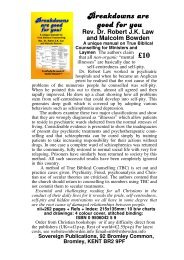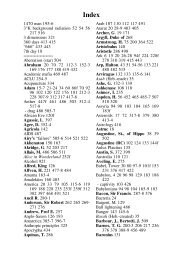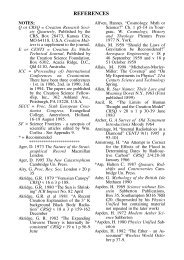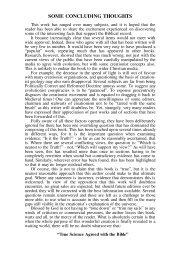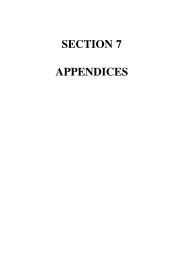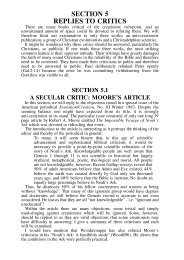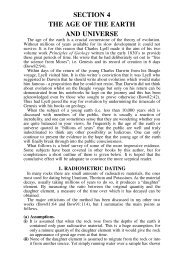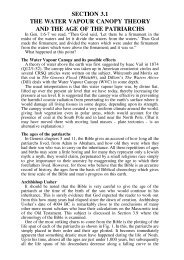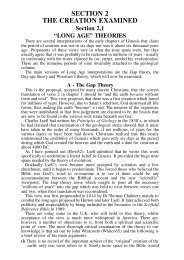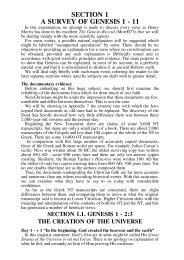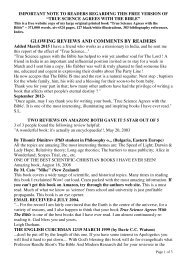TSAWTB Section 6 - Interlude - A Miscellany of Items
True Science Agrees with the Bible, Section 6 - Interlude - A Miscellany of Items (pp. 250-288)
True Science Agrees with the Bible, Section 6 - Interlude - A Miscellany of Items (pp. 250-288)
Create successful ePaper yourself
Turn your PDF publications into a flip-book with our unique Google optimized e-Paper software.
274 <strong>Section</strong> 6 - <strong>Interlude</strong><br />
(evangelical) Christian faith should be kept very private, such that it was not<br />
even discussed with family members. Almost certainly, they would have<br />
become aware <strong>of</strong> his new interest, but there could have been an unspoken<br />
agreement that it should be completely ignored; they also would have been<br />
well aware <strong>of</strong> the repercussions.<br />
Darwin may have maintained his stance <strong>of</strong> agnosticism for the benefit <strong>of</strong> his<br />
public image, but asked Lady Hope, whose vibrant evangelical faith was<br />
obvious to all, to visit him and discuss her faith with him. As I contended in a<br />
previous work, Darwin seems to have had one attitude for his atheistic<br />
contacts, and another for his local acquaintances. Was he hoping to have the<br />
“best <strong>of</strong> both worlds”?<br />
Emma Darwin<br />
Some have suggested that Emma herself was behind the “Lady Hope story”,<br />
but this does not bear critical examination. That Lady Hope wrote the account<br />
for the Watchman Examiner is beyond dispute.<br />
Moore notes (p119) that Emma was “reportedly present” on 28th<br />
September, when he suggests Lady Hope came. Whatever day she visited, we<br />
can be fairly certain Emma was present in the house.<br />
Emma Darwin’s silence does present a problem. She was keen to get<br />
Darwin to read his Bible, and if he was reading it when Lady Hope came,<br />
surely she would have rejoiced and referred to it at some stage. Yet she is<br />
silent. She was also sympathetic to the Band <strong>of</strong> Hope, entertaining them in the<br />
house, as she wrote on 18th August 1881, about the time when Lady Hope<br />
would have been visiting. Also, Fegan wrote that sometimes members <strong>of</strong> the<br />
family came to his Gospel services. That they did not go regularly suggests<br />
that they did not have an evangelical faith - a crucial distinction in the eyes <strong>of</strong><br />
this writer at least, which may explain much that seems inexplicable at this<br />
distance in time.<br />
She wrote to Darwin in 1838 when they were courting, begging him to read<br />
his Bible and referred to “our Saviours farewell discourse” in John’s Gospel.<br />
The family attended the local Anglican church but in 1871 left for another<br />
when a boorish new vicar came. However, she held firmly to the Wedgewood<br />
family’s Unitarian beliefs and Moore says Emma was “Unitarian by<br />
conviction, Anglican in practice” (M:14 and Desmond:403).<br />
Emma’s silence about a change in Darwin’s faith is against Lady Hope’s<br />
account, but Moore notes that in 1881 she said that “nothing can be said too<br />
severe upon the doctrine <strong>of</strong> eternal punishment for disbelief” (M:36).<br />
That none <strong>of</strong> the family were evangelical leaves the possibility that they<br />
may all have been disturbed by any deep change <strong>of</strong> heart by their famous<br />
father. Even Emma, who rejected evolution and was concerned for her<br />
husband’s beliefs, “would not have tolerated anything so intrusive as personal<br />
evangelizing” (M:57).<br />
The date <strong>of</strong> her visit<br />
Moore gives no evidence for his suggestion that she came in the afternoon<br />
<strong>of</strong> the 28 September - the same day as Darwin’s visitors. There was very good<br />
weather on 14, 16-18 September and 28 September - 4 October. Fegan fell ill<br />
in early July and Lady Hope could have visited Darwin several times during<br />
his absence, with her last and most memorable visit that took place in the late<br />
sunny period being the one she most clearly remembered and recorded.<br />
There is one important point. Moore notes that none <strong>of</strong> those in the family



